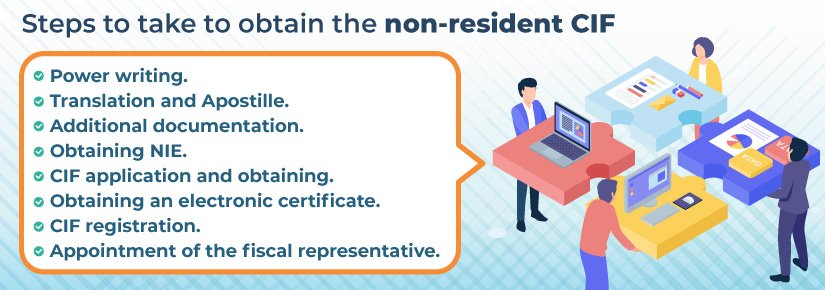How long does it take to begin doing business in Spain?


There is no need for big structures, nor branch offices, nor subsidiaries – you do not even need to invest a large amount of money – in order to do business in Spain. From a legal point of view, there is a much easier way of doing business in Spain without incurring great costs: this is by obtaining either a Non-Residents’ CIF (Corporate Tax Code) or a NIF (Non-Residents’ Tax Code).
Setting up a company in Spain involves a number of steps which can be complicated and may lead to delays in beginning operations; steps such as filing taxes, accounting procedures, company registration and employment obligations.
However, having a Non-Residents’ CIF allows the following operations to take place in Spain:
- Events such as courses, exhibitions or conferences
- Importing goods
- Sales of goods to consumers over the internet
- Sales of products to Spanish companies
- Technical equipment instalment
- Telecommunications service provision
- A sector-specific market study can be carried out by someone in Spain
How to obtain a Non-Residents’ CIF or NIF
These are the steps required to obtain a Non-Residents’ CIF or NIF:
- Power of Attorney. A foreign company must provide a notarized power of attorney that will allow LEIALTA to act on their behalf. LEIALTA can provide the wording of this power of attorney and it should grant powers of representation to one of our partners to file tax returns and represent the foreign company before the Spanish Tax Authorities. A power of attorney can be drafted in one day.
- Translation and apostille. The power of attorney must be translated into Spanish and should be notarized with the apostille from the Hague Convention. The Hague Convention apostille is a method used to legalize documents and prove their authenticity for international legal purposes. It is the client’s responsibility to translate the power of attorney and obtain the apostille, which takes approximately one day to complete. This documentation must be sent in hard copy to LEIALTA in order for our team to be able to act for the foreign company.
- Additional documentation. Documented proof that reflects the existence of the company in the foreign country along with the identification of the company’s legal representatives must be provided. This document is usually issued by the Companies’ Registry in the country where the company is registered.
- NIE. A NIE number for the company’s non-resident legal representative must be obtained from the Spanish tax authorities. This usually takes between one and three days, depending upon available appointments.
- Requesting and obtaining a CIF. All the above-mentioned documentation is filed before the Spanish Tax Authorities in order to request a CIF. It usually takes one to three days to come through.
- Digital signature. In order to work with the Spanish Tax Authorities, the company must have a digital signature which is issued within three days of requesting one.
- CIF registration. This can be done online and it usually takes one day, depending upon the workload at the Spanish Tax Authorities.
- Appointing a tax representative. This person should be tax resident in Spain. It takes one day to make this appointment.
It is therefore possible to get your company up and running in Spain within the space of seven or eight weeks.
Other important steps that must be taken, depending upon the type of company, include ROI/ VIES registration of the company’s VAT number for international validation within the European Union, and a delay on VAT payments for imported goods, which must be requested in November and takes three months to be conceded.
If the foreign country needs to take on employees in Spain, these workers must be registered with social security, alongside the Non-Residents’ Corporate Tax CIF number.
Once the above-mentioned paperwork has been completed, the company will then be registered with the Spanish Tax Authorities and will be able to file taxes and make the corresponding payments. Although tax obligations are set in accordance with the company’s activity, certain taxes such as VAT should be declared and settled, whereas corporate tax will not apply because the company does not have a permanent residence.
Once the company grows in Spain, increases the number of employees or rents an office or business premises, it will be time to consider whether it would make better legal sense to set up a limited company, which brings with it more tax and corporate obligations.
All of these steps require advice from a trusted Spanish business consultant who has in-depth knowledge of Spanish rules and regulations, with experience of setting up companies in Spain and who can work through the paperwork with ease.
Leialta website: https://www.leialta.com/en/
Blog for doing business in Spain: https://www.leialta.com/en/blog-for-doing-business-in-spain/
